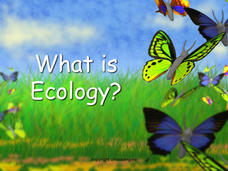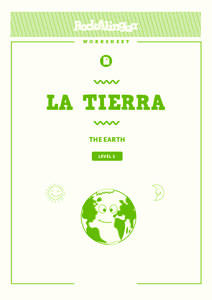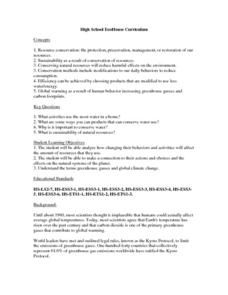Beyond Benign
Ecological Footprint
How does your lifestyle measure up in terms of your ecological footprint? Young ecologists examine their impact on the planet using an insightful online calculator. A short quiz asks users to rank the size of their homes, their energy...
Core Knowledge Foundation
Ecology Tell It Again!™ Read-Aloud Anthology
A read-aloud anthology provides informational texts about ecology to boost reading comprehension. Third-graders listen and discuss readings where they answer questions and focus on vocabulary. Pupils complete extension activities,...
Biology Junction
What Is Ecology?
Do you know the name for the biological study of interactions? A short presentation with accompanying worksheet introduces individuals to ecology. The materials offer a broad overview of the subject and the levels of organization to...
Chicago Botanic Garden
Are You Bigfoot?
Scholars independently explore several websites to calculate their ecological footprint. Using their new found knowledge, they answer six short-answer questions and take part in a grand conversation with their peers about how our...
K12 Reader
Taking Care of Earth
Provide a brief introduction to ecology and conservation with a reading passage. Learners can read the text, answer the five related questions that are included on the page, and discuss the reading.
Howard Hughes Medical Institute
Modeling Trophic Cascades
In the ecological game of who eats who, one small change can have a big impact! Individuals create food chains in an array of ecosystems, then determine what happens to organisms in the chain when one organism changes its feeding...
Howard Hughes Medical Institute
Lesson 2: Gorongosa National Park
How has Gorongosa National Park changed over time? Discover the park's rich history, dating back to primitive human times, through an interactive timeline and scientific reading. The second installment in an eight-part series explores...
NASA
Biology Training Conclusion
Gravity is just one consideration when determining human habitability on a new planet. The lesson connects four different units and starts with connecting the various systems: planetary systems, human body systems, etc. After scholars...
World Wildlife Fund
Arctic Food Chain
Explore the food chains that support Arctic ecosystems. A class discussion on interdependence and the different roles plants and animals play in ecosystems provides young scholars with the knowledge to complete a worksheet asking them to...
College Board
2003 AP® Environmental Science Free-Response Questions
One size fits all doesn't seem to be the right approach to endangered species. Using a four-part AP® assessment, learners respond to questions that address environmental concerns such as human population changes, invasive species...
Beyond Benign
Evaluating Sustainability and Lifecycle
What makes one product greener than another? Ecology scholars analyze sustainability and lifecycle through a thought-provoking activity. Individuals pick a product, then examine its components to determine its overall impact on the world...
Howard Hughes Medical Institute
Lesson 4: Gorongosa's Food Webs
Who eats who in the savannas of Africa? Explore trophic levels with part four of an eight-part series of lessons focused around Gorongosa National Park. After young explorers identify animals using trailcam images, they construct a food...
Rock A Lingua
La Tierra (The Earth)
¡Es importante cuidar la tierra! Encourage beginning Spanish speakers to protect their planet and practice their vocabulary with a series of worksheets. Learners fill in the blanks, match animal vocabulary with pictures, and complete...
PBS
Symbiotic Strategies: The Secret Lives of Sharks and Rays
Learners investigate the interaction in an oceanic ecosystem. For this symbiotic relationship lesson, high schoolers investigate how ecological relationships evolve over long periods of time in order to maintain balance and stability of...
Curated OER
High School EcoHouse Curriculum
How has the level of carbon dioxide changed over recent years, and what is contributing it? Groups work together to research and present their findings in a creative way. Also built into the lesson is a visit to a sustainable house, but...
Curated OER
The Chesapeake Bay in Captain John Smith's Time
When Captain John Smith visited the Chesapeake Bay in the summer of 1608, what types of animals and habitats did he encounter? Your young historians will analyze primary source documents to answer this question, as well as compare the...
Chicago Botanic Garden
Faces of Climate Change
Sometimes, the best solution to a problem can be found by walking in someone else's shoes. Here, scholars use character cards to take on the roles of people around the world. They determine how their character's life affects our...
Rice University
Biology for AP® Courses
An eight-unit electronic textbook provides a guide to AP® Biology. Each of the 28 chapters include an introduction, multiple lessons, a summary, review questions, and test prep questions. Teachers see how each lesson connects to a big...
Chicago Botanic Garden
Reflecting on What I Learned About Climate Change
After three eye-opening lessons about our environment, scholars revisit a 10-question survey, reflect on their new-found knowledge, and take action by writing to a representative or creating a public service announcement about climate...
Earth Day Network
Healthy Earth, Sick Earth
Earth is sick and needs our help! Read the children's book Planet Earth Gets Well to explain the various problems facing the planet, discussing what young conservationists can do to heal the planet along the way. A great Earth Day...





















